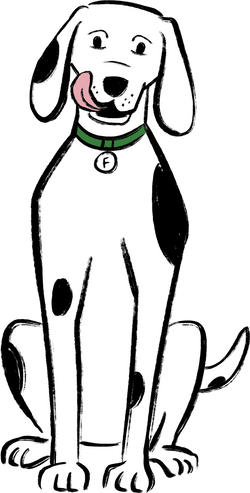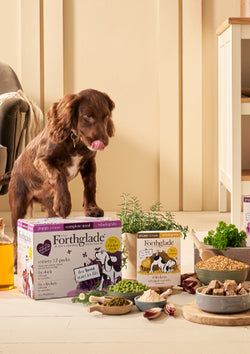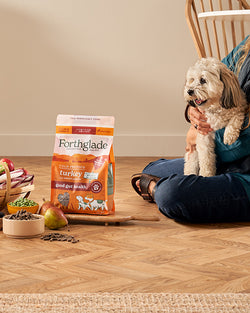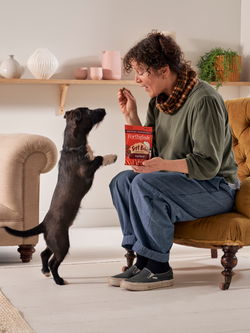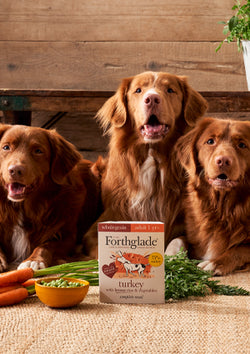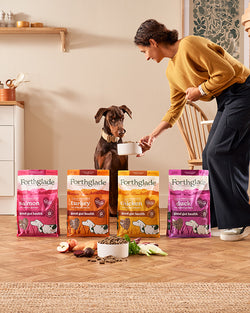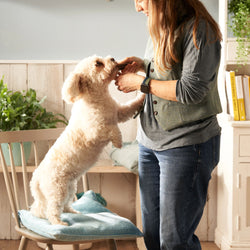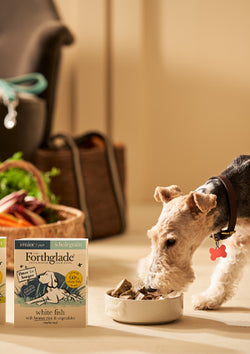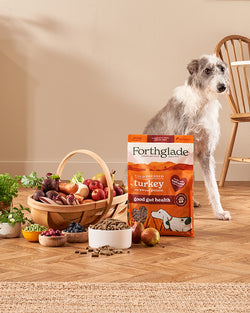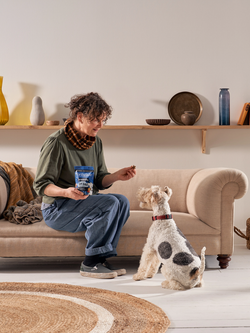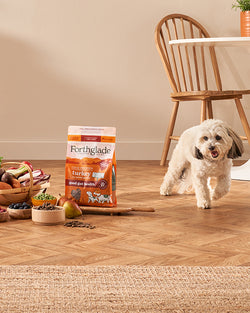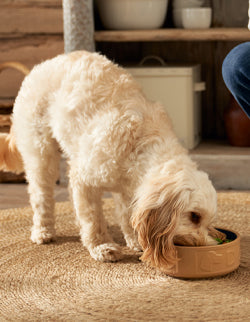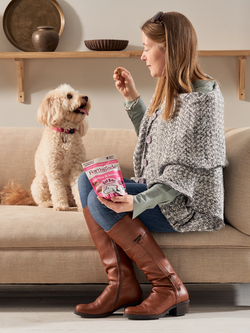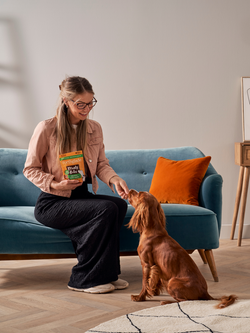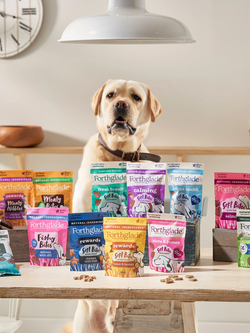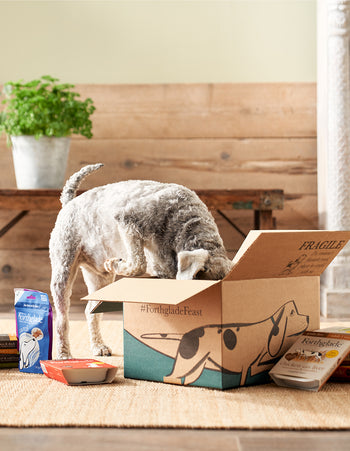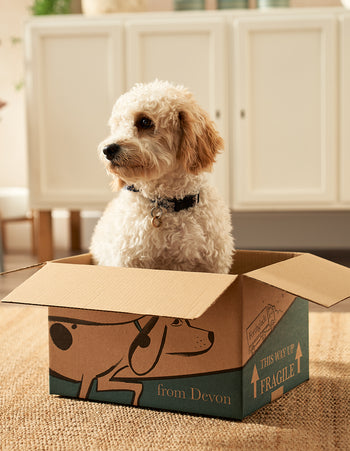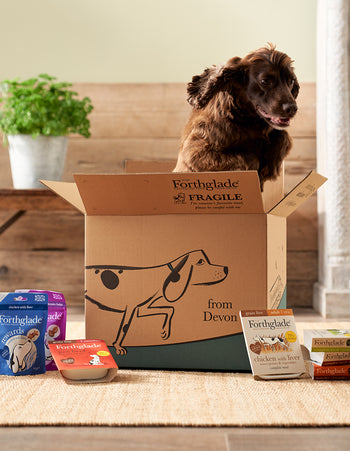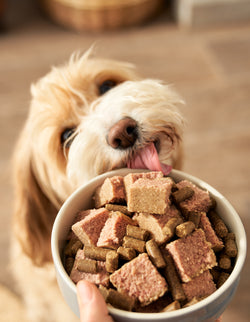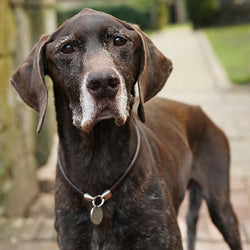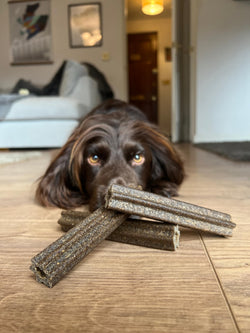
There are so many things we have around our homes that are entirely harmless to us, but can actually be poisonous and potentially life-threatening to dogs. Whether you’re a long-term or new dog owner, it’s important to be aware of the toxic food dogs can’t eat, and to make sure you’re feeding high-quality food for your dog.
What foods can't dogs eat?
As much as we may love to give our dogs a treat bite of the food we eat, it may be that it’s a food dogs can’t eat – or that should only be given in moderation. Some food items may be hazardous if not cut into bitesize pieces as they could cause choking, while others are toxic by nature, and could even lead to medical conditions such as kidney failure.
Top 10 toxic foods for dogs
- Chocolate – A commonly-known toxin for dogs, chocolate contains a chemical called theobromine which dogs are not able to metabolise. Vomiting and excessive urinating are tell tale signs that your dog may have consumed some.
- Grapes & raisins – It isn’t clear what makes grapes and raisins dangerous for dogs, however their poisonous nature can cause kidney failure, and so you should contact your vet straight away if you suspect they’ve eaten them.
- Xylitol (found in sweets, chewing gum & some peanut butter) – Xylitol is known to produce high levels of insulin in dogs, prompting their blood sugar to drop to very low levels. If lots is consumed, xylitol can lead to liver failure.
- Onions & garlic – These toxic foods contain substances that cause damage to your dog’s red blood cells, and could cause anaemia or death in extreme cases. If you think your dog may have eaten food containing onions or garlic, you may notice symptoms such as weakness, vomiting, abdominal pain or diarrhoea.
- Avocado – While the flesh of an avocado is relatively safe and contains numerous vitamins and minerals, the pit of an avocado is hazardous for dogs and could cause choking. The skin of an avocado is also mildly toxic and could lead to vomiting.
- Alcohol – Dogs cannot metabolize alcohol and so any drinks, food or other household products containing alcohol is dangerous for dogs. If your dog has accidentally consumed alcohol, you may notice symptoms such as excessive panting, low body temperature, lethargy and vomiting.
- Macadamia nuts – While no one knows what exactly causes toxicity in macadamia nuts for dogs, it is clear that even small amounts can be very dangerous for dogs. You should contact your vet straight away if you think your dog has accidentally gotten their paws on some.
- Dairy – Dogs are lactose intolerance and so dairy and dairy-based products can cause negative digestive reactions in dogs, such as diarrhoea or vomiting.
- Caffeine – Like chocolate, caffeine contains a chemical that dogs are unable to metabolise. This can lead to symptoms such as vomiting, excessive panting and urinating.
While it can always be tempting to treat our dogs to a bite of a human snack, it’s best that we feed them quality food and avoid human food to ensure they don’t encounter these foods. Explore Forthglade’s Wet or Dry Dog food range to find food for a balanced diet.

What should you do if your dog eats toxic food?
If you think your dog has accidentally consumed some of the foods above, it’s important that you consult your vet as soon as possible and let them know what it is that they have eaten and how much too. Your vet will be able to advise you on symptoms to look out for and what treatment may be necessary to look after your dog.
What foods are bad for dogs?
It’s important to be wary of what human food your dog gets into as there are other foods that you may have around the house that are not necessarily toxic, but can be bad for dogs, particularly if eaten in large amounts.
Can dogs eat rhubarb?
While the stems of rhubarb are okay, rhubarb leaves contain an acid that makes them mildly toxic for dogs, and can cause severe stomach discomfort and irritation.
Can dogs eat leeks?
While less potent than onions and garlic, leeks contain the same substance that can cause damage to red blood cells and can be toxic to dogs. If your dog eats a small bite of leek by accident, they should probably be okay – however symptoms of larger amounts include intestinal upset, such as decreased appetite, diarrhoea and vomiting.
Can dogs eat black pudding?
Given that black pudding typically contains onion and garlic, which are known toxins for dogs, as well as a high content of fat and salt, black pudding is not recommended for dogs. The dish is likely to cause an upset stomach and potentially diarrhoea.
Can dogs eat nuts?
Depending on the variant on nut, many unflavoured nuts can be given as an occasional treat. However, they are high in calories and fat – and often have added salt – which can lead to obesity and pancreatitis, and so nuts should be fed in moderation. You should also be mindful of the size and shape of the nuts you are feeding as they could be a choking hazard, with some nuts (such as walnuts, brazil nuts and almonds) large in shape and size and may be harder for some dogs to chew and break done.
Unsalted almonds, pecans, Brazil nuts and hazelnuts are all fine to be fed cautiously, but do bear in mind that they are high in fat content and so it’s best to avoid feeding too many.
Peanuts are generally safe to eat, however be mindful of flavoured peanuts which can cause symptoms due to high salt content. Peanut Butter is also a substance to be mindful of, as many nut butters contain xylitol – a sweetener that is dangerous for dogs.
Walnuts are generally safe to eat, especially English walnuts, however black walnuts are highly toxic to dogs and should not be fed to dogs.
Macadamia nuts in particular are toxic to dogs and should be avoided, with even the smallest quantity being extremely dangerous for dogs.
Is bread bad for dogs?
Bread can mostly be fed to dogs with no harm, however it isn’t a nutritional food for dogs and is high in carbohydrates which could lead to obesity, so it is best to be avoided if you can. If you are going to feed your dog bread, make sure that it doesn’t contain any other toxic ingredients such as raisins, garlic or chocolate, and make sure that the dough is fully cooked.
What human food can dogs eat?
The occasional treat of human food that is okay for dogs to eat can supplement their diet nicely. Dogs are able to eat certain fruits (e.g. banana, apple, blueberries, melon, pears, raspberries & mango) – just be careful to remove any seeds and cores. Vegetables that are safe for dogs also include carrots, squash, broccoli, green beans and cucumber (in small portions). Rice is also a human food that is suitable for dogs, and is a healthy carbohydrate that can be paired with your dog’s regular diet, such as our complementary food.
Forthglade’s healthy dog food and treats
While we all enjoy feeding a special treat to our dogs, potentially feeding your dog a harmful human food can cause sickness and so it is safest to feed a specifically-made nutritional dog treat and meals.
At Forthglade, our natural and nutritious dog treats are designed to nourish your dog in between mealtimes. Available in a range of flavours – with varying amounts of protein content – our treat recipes are hypoallergenic, grain-free and always free from junk, artificial flavours and preservatives – meaning that they’ll be easy for your dog to digest.
With a range of natural, nutritional dog food available in our range – including puppy food for younger dogs and adult dog food for full grown dogs – you’re sure to find everything you need for a properly nutritious dog diet.
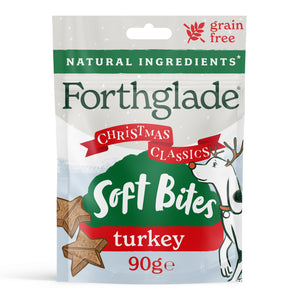
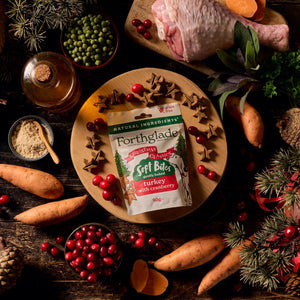


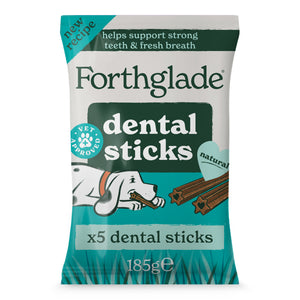
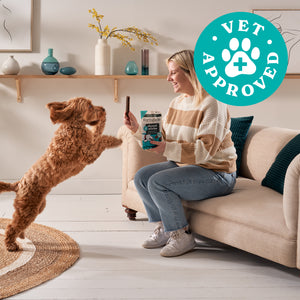
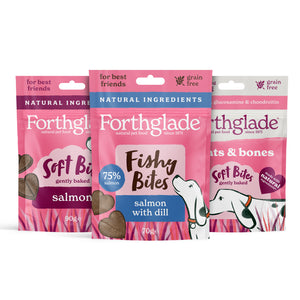
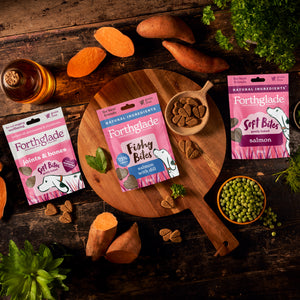
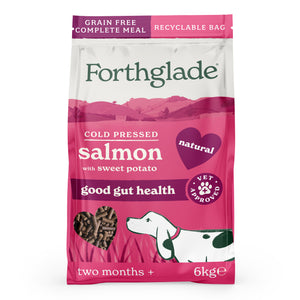
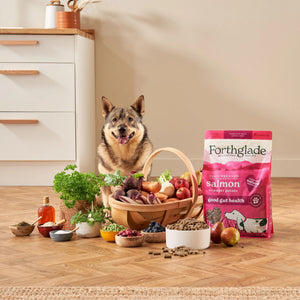
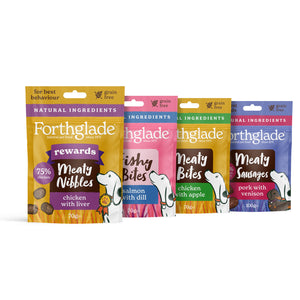
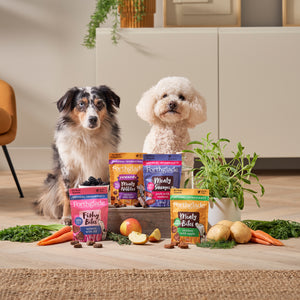


 Over 13,000 5* Reviews
Over 13,000 5* Reviews
 Subscribe & Save At Least 10% Off Every Order!
Subscribe & Save At Least 10% Off Every Order!

